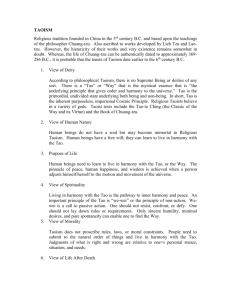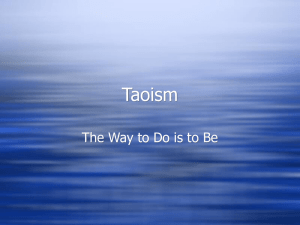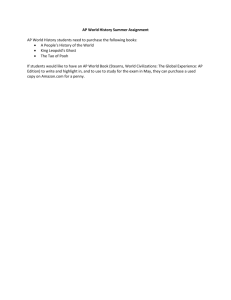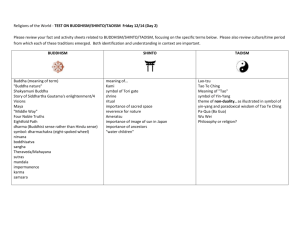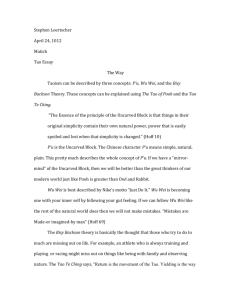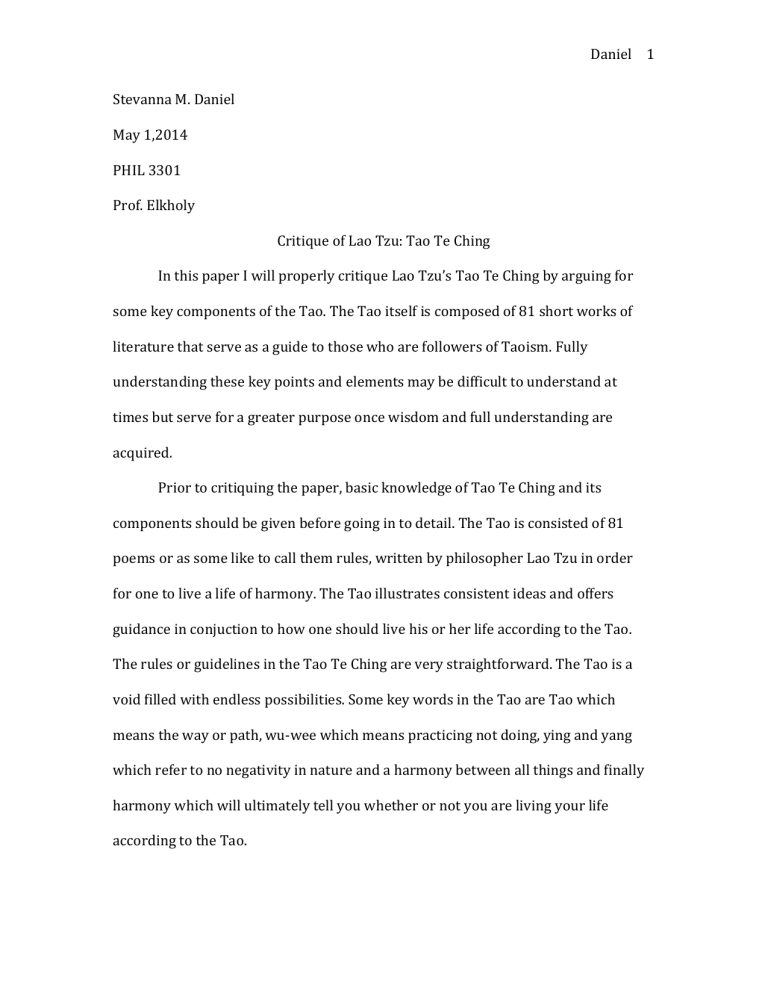
Daniel 1 Stevanna M. Daniel May 1,2014 PHIL 3301 Prof. Elkholy Critique of Lao Tzu: Tao Te Ching In this paper I will properly critique Lao Tzu’s Tao Te Ching by arguing for some key components of the Tao. The Tao itself is composed of 81 short works of literature that serve as a guide to those who are followers of Taoism. Fully understanding these key points and elements may be difficult to understand at times but serve for a greater purpose once wisdom and full understanding are acquired. Prior to critiquing the paper, basic knowledge of Tao Te Ching and its components should be given before going in to detail. The Tao is consisted of 81 poems or as some like to call them rules, written by philosopher Lao Tzu in order for one to live a life of harmony. The Tao illustrates consistent ideas and offers guidance in conjuction to how one should live his or her life according to the Tao. The rules or guidelines in the Tao Te Ching are very straightforward. The Tao is a void filled with endless possibilities. Some key words in the Tao are Tao which means the way or path, wu-wee which means practicing not doing, ying and yang which refer to no negativity in nature and a harmony between all things and finally harmony which will ultimately tell you whether or not you are living your life according to the Tao. Daniel 2 The ultimate goal in Taoism is to find harmony and balance in your life through self-exploration and self-improvement. It is ultimately your decision as to what you do with the Tao and how you take in what you learn. The Tao also believes that you belong to a whole. Some of Lao Tzu’s most significant teachings through the Tao Te Ching include non-contention, non action, non intention, simplicity, wisdom, humility, duality/wholism, ch’I and finally te. I will briefly go through each concept and explain what they mean and how one can achieve these concepts through the Tao. While doing so I will argue for some of these concepts while providing examples from a modern day point of view. I think it is important to note that Taoism is not a religion but more so a way of life. Non-Contention is the concept that violence and conflict only bring about negative side effects. According to Tao Te Ching the proper way to deal with violence or conflict is through peaceful solutions. When I think of non-contention I think of two individuals getting into a heated argument and letting their emotions portray anger and violence or even an individual who is going through a tough time and decides that hurting themselves is their mode of expression, which usually leads to either more anger and violence or no solution at all. For someone who may be going through a difficult or negative time alone it may be difficult to seek a positive solution without any guidance. At times it is hard to thoroughly think of peaceful solutions to a problem when you are enraged with anger or faced with a negative situation. The Tao teaches you to find peace through times of anger or violence which many who follow Taoism have conflict with because of the difficulty of finding peace through hard times. Tao Te Ching tells you what to do when it comes to non- Daniel 3 contention but does not tell you how to find a peaceful solution when faced with negative situations. Non-action is the concept of being wise and achieving everything you want once you are in tune with the Tao. Many people spend a great deal of time and energy trying to over do any and everything and end up achieving nothing. Rushing through something and overworking yourself and not receiving the result you want will only lead to an imbalance of harmony in your life. If you take your time and let certain things work out for themselves you will find yourself more balanced and in tune with life. The wise sit back and do not seem to do much at all and yet achieve anything they want. Sitting back and allowing life to happen is apart of the ancient word wu-wee which essentially means practicing not doing. Apart of achieving anything you want through Tao Te Ching is apart of being in tune with harmony, which essentially is being in tune with the Tao. The idea of non-action is an example of what being in tune with harmony can bring to your life. Non-intention is being able to perform positive and virtuous deeds without expecting anything in return. At times we may do things like donate money to the homeless or help someone in need in order to gain recognition or expect something in return without realizing the true meaning of performing these acts. In today’s day and age we come across many people who like to make themselves look better, such as politicians who perform acts of virtue in order to gain things such as votes or the likes of their voters. When it comes to non-intention politicians came to mind. In cases like the politician is not abiding by the idea of non-intention. According to the Daniel 4 Tao true virtue is a state in which positive actions come forth naturally, requiring no conscious effort or thought. Taoism focuses a lot on simplicity and learning how to enjoy to the little things in life. Simplicity is the basis for our existence and reality. When you think of babies who come into this world without a care or worry and find joy in the simple things such as the warmth of a mother or the comfort of a father, you think of how simple their lives are until they grow up and realize the type of world they are living in. Here in the United States we get so caught up in the material world to the point where we forget to sit back and enjoy the simple things in life that are priceless. As humans we like to create problems for ourselves by making things more complex and difficult than they are. Learning how to simplify your life will bring about much satisfaction and harmony. I think simplicity goes hand in hand with another major concept in Taoism. As one learns to live life simplify and learn through experience, wisdom can be acquired. Wisdom is the quality of having experience, knowledge, and good judgment. According to the Tao there is a limit to what we can understand through rationality and reasoning. Engaging in our intuition fully leads to wisdom. Taking the positive out of a negative situation that you may have experienced in the past can lead to wisdom in the future. At times wisdom is viewed as being related to aging. It is said that the older you get the wiser you become. In media and film, wisdom is usually portrayed through an elder of a family to whom everyone runs to when they need advice from someone more experienced and knowledgeable than they are. Daniel 5 Humility is probably my favorite concept in Taoism. Humility is the idea that the more you learn the more you realize that there is so much more to learn. To me humility and wisdom also go hand in hand. Being ale to continually learn more and m ore throughout life is a gift in itself that you cannot place a price on. As we get older we experience certain things and realize that some times it is best that things do not work out the way we want them to. Through these experiences we acquire wisdom, which leads us to learn more and experience more throughout life. Ignorance is usually related to lack of knowledge and humility because one who is ignorant usually has a closed mind and is not open to learning more things. With ignorance usually comes arrogance and a big ego. Duality/Wholism better known as yin and yang is the idea that all qualities in the world have meaning only by the existence of their opposites. Yin is known to be dark, negative and feminine while yang is known to be positive, bright and masculine. The interaction of these two principles bring about the destiny of certain things. Good exist in the world so long as evil exists also. One cannot do without the other. For example you cannot have night without day or sadness without happiness. When I think of yin and yang I think of the fact that you cannot have a high point without having a low point at some point in time. As humans we sometimes go through situations in which we feel as though we have reached the lowest of lows in our life and we forget that when you are rock bottom the only way to go from there is up. Ch’I is a major Taoist concept that translates into air, vapors, ether, breathing, and energy. Ch’I also means temperament, power, and atmosphere. Ch’I is Daniel 6 the vital life force and spiritual energy that flows throughout all beings when I think of Ch’I I think of being one with nature. It is amazing the impact nature has on a persons being. For example a lot of people like to go outside and take a walk or go on a run whenever they feel troubled or angry because of the affect that nature has on your mood. Being one with nature gives you time think and reflect on yourself in a positive manor. It is a force that sustains all things once they are created. Ch’I provides balance through nature. The final concept in Taoism that I will be going over is Te. Te translates into virtue and power. Te is the specific quality that Tao gives to any and everything. Te is gained once the Tao is found. Essentially Tao is apart of the harmony that one receives when they attain the Tao. That certain balance that they were looking for on their journey to the Tao. Once attained Te can bring about balance, harmony and joy. Overall I believe Taoism is a great way to achieve harmony and balance in your life if that is what you are seeking. If you plan to live by Taoism it is important to make a conscious effort to stick to all principles of the Tao. Taoism is not a religion or metaworld that forces certain practices down your throat. In turn it is a way of life that works to help you seek balance and harmony in a world full of chaos. When the Tao is balanced it is possible to find that perfect joy that many believe is not attainable.
